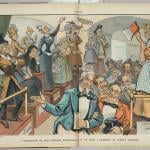In an article in the Review of Metaphysics (1997), David Weberman argues for the “nonfixity of the historical past.” He starts from Arthur Danto’s argument that historical inquiry and writing cannot be a reconstruction available to an “ideal chronicler” who knows everything that happens the moment it happens and sets it down as it happens in just the way it happens. Historians can’t do this because they use “narrative sentences” like “The Thirty Years War began in 1618,” a sentence... Read more















